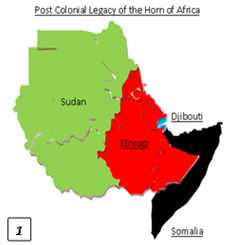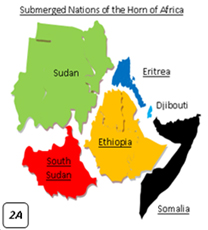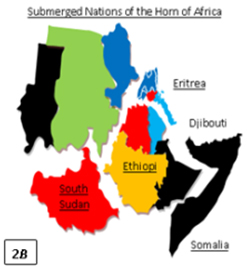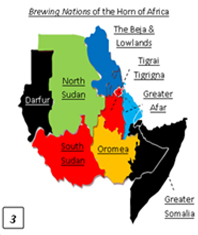Page 1 of 2
How Ethiopia collapse will change Africa
Posted: Mon Aug 08, 2016 7:35 am
by xiimaaya
It's wishful thinking and I highly doubt the west will allow the country to disintegrate to collapse . the Somalis are so weak we expect others to free us. My question is How will the collapse help somalida? And what will happen to the likes of Ina iley and it's stooges in somalia/Somaliland?
Re: How Ethiopia collapse will change Africa
Posted: Mon Aug 08, 2016 7:55 am
by MaydhMax
well your title mentions africa i'd like to ask you then how other african countries that are not somali-inhabited be affected e.g. egypt, sudan,eritrea
Re: How Ethiopia collapse will change Africa
Posted: Mon Aug 08, 2016 7:57 am
by BosasoShaam
xiimaaya wrote:It's wishful thinking and I highly doubt the west will allow the country to disintegrate to collapse . the Somalis are so weak we expect others to free us. My question is How will the collapse help somalida? And what will happen to the likes of Ina iley and it's stooges in somalia/Somaliland?
Ethiopia is not like Somalia, you hardly see someone picking a gun against the Government there.
They are more civilized and educated, things will come to the normal life.
As much I wanted Ogadenia to be freed and joins Somalia, as much it's a dream.
Re: How Ethiopia collapse will change Africa
Posted: Mon Aug 08, 2016 12:10 pm
by Strategic
ethiopia is a dictatorship held by gun,there wil no freedom,GDP per capita lower than somalia,huge hungry population,somalia needs to be smart,start trading with them instead of unfriendly ties.renovate that mogadishu -addisaba road,let the goods flow in n out.
Re: How Ethiopia collapse will change Africa
Posted: Mon Aug 08, 2016 12:10 pm
by Strategic
as long as somalia is fragile,ogadenia is better off under ethiopia colonization.
Re: How Ethiopia collapse will change Africa
Posted: Mon Aug 08, 2016 12:40 pm
by Halmogg
Best scenario would be an independent Ogadenia, joining the carcass called somalia will be a big mistake.
Re: How Ethiopia collapse will change Africa
Posted: Mon Aug 08, 2016 1:10 pm
by Masaasbaa
BosasoShaam wrote:xiimaaya wrote:It's wishful thinking and I highly doubt the west will allow the country to disintegrate to collapse . the Somalis are so weak we expect others to free us. My question is How will the collapse help somalida? And what will happen to the likes of Ina iley and it's stooges in somalia/Somaliland?
Ethiopia is not like Somalia, you hardly see someone picking a gun against the Government there.
They are more civilized and educated, things will come to the normal life.

Re: How Ethiopia collapse will change Africa
Posted: Mon Aug 08, 2016 1:46 pm
by Jabuutawi
We have a bunch of Uncle Toms here, except they are bootyclapping for Uncle Tedross.
I will let you folks sort out among yourselves who the house negroes are, and, who the field negroes are. Don't let the kitfo dish go to waste!
Re: How Ethiopia collapse will change Africa
Posted: Wed Aug 10, 2016 8:06 am
by BeyondQabil
Typical nonsense from zoomalians who get turned on at the site of v]blood. Just check related threads and you'll see how your desires will turn into nothingness.
Re: How Ethiopia collapse will change Africa
Posted: Wed Aug 10, 2016 8:09 am
by xiimaaya
Somalia will collapse a second time before Ethiopia once again .
Re: How Ethiopia collapse will change Africa
Posted: Wed Aug 10, 2016 8:27 am
by Kudo
xiimaaya wrote:It's wishful thinking and I highly doubt the west will allow the country to disintegrate to collapse
West might not want to see that happen but west is not all powerful and their plans usually backfires. Things have started moving in ethiopia that cannot be supressed much more.
Re: How Ethiopia collapse will change Africa
Posted: Wed Aug 10, 2016 8:29 am
by Halmogg
When the dust settles, they will all fall in line and follow whoever takes over. Unfortunately they not retarded like somalis
Re: How Ethiopia collapse will change Africa
Posted: Wed Aug 10, 2016 3:24 pm
by Togdeer
Somaliland needs to become friends with the next government.
As much I hate Ethiopia and I want them to fall for all the things they have done to the Somali people.
But reality is Ethiopians are not like Somalia. They are very peaceful people and would find peace instantly. The best thing for us to do is boost economic relations, boost trade. We should become a major exporting nation.
Re: How Ethiopia collapse will change Africa
Posted: Wed Aug 10, 2016 6:04 pm
by xiimaaya
Togdeer wrote:Somaliland needs to become friends with the next government.
As much I hate Ethiopia and I want them to fall for all the things they have done to the Somali people.
But reality is Ethiopians are not like Somalia. They are very peaceful people and would find peace instantly. The best thing for us to do is boost economic relations, boost trade. We should become a major exporting nation.
Looking already for the next pimp to pimp you out


Too soon my nigga
Re: How Ethiopia collapse will change Africa
Posted: Wed Aug 10, 2016 10:11 pm
by PureQ
OneSomaliaHussein wrote:well your title mentions africa i'd like to ask you then how other african countries that are not somali-inhabited be affected e.g. egypt, sudan,eritrea
90 million ethiopians could affect the demographic in all over north east africa
If war breaks out, afar, ogaden, tigray, beshingual, gambellans will wake up and they all have blood bond with neighboring ethnic groups where it could spill over.
Water will affect egypt, sudan, uganda. They will intervene or start a proxy. Most def Egypt will.
Al shabaab gain power when ethiopia withdraws. Could steam roll somalia and possible entering Ethiopia once the government lose control of borders.
West losing grip of red sea. Will intervene to protect their best friends like always.
What does it tells you?
Back in 2002, Meles Zenawi, then prime minister of Ethiopia, drafted a foreign policy and national security white paper for his country. Before finalizing it, he confided to me a “nightmare scenario” — not included in the published version — that could upend the balance of power in the Horn of Africa region.
The scenario went like this: Sudan is partitioned into a volatile south and an embittered north. The south becomes a sinkhole of instability, while the north is drawn into the Arab orbit. Meanwhile, Egypt awakens from its decades-long torpor on African issues and resumes its historical stance of attempting to undermine Ethiopia, with which it has a long-standing dispute over control of the Nile River. It does so by trying to bring Eritrea and Somalia into its sphere of influence, thereby isolating the government in Addis Ababa from its direct neighbors. Finally, Saudi Arabia begins directing its vast financial resources to support Ethiopia’s rivals and sponsor Wahhabi groups that challenge the traditionally dominant Sufis in the region, generating conflict and breeding militancy within the Muslim communities.
Fourteen years later, reality has exceeded Zenawi’s nightmare scenario; not only has every one of his fears come to pass, but Egyptian President Abdel Fattah al-Sisi and Saudi King Salman bin Saud are working hand-in-glove on regional security issues — notably in Yemen and Libya — which has raised the stakes of the long-running Egypt-Ethiopia rivalry. If the worsening tensions in the Horn of Africa erupt into military conflict, as seems increasingly possible, it wouldn’t just be a disaster for the region — it could also be a catastrophe for the global economy. Almost all of the maritime trade between Europe and Asia, about $700 billion each year, passes through the Bab al-Mandab, the narrow straits on the southern entrance to the Red Sea, en route to the Suez Canal. An endless procession of cargo ships and oil tankers passes within sight — and artillery range — of both the Yemeni and African shores of the straits.
Zenawi’s nightmare scenario, in other words, may soon become the world’s — and no one has a white paper to prepare for it.
A crisis in the Horn of Africa has been a long time in the making. The regional rivalries of today date back to 1869, when the Suez Canal was opened to shipping, instantly making the Red Sea one of the British Empire’s most important strategic arteries, since almost all of its trade with India passed that way. Then as now, the security of Egypt depended on control of the Nile headwaters, 80 percent of which originate in Ethiopia. Fearful that Ethiopia would dam the river and stop the flow, Egypt and its colonial masters attempted to keep Ethiopia weak and encircled. They did this in part by divvying up rights to the Nile’s waters without consulting Addis Ababa. For example, the British-drafted Nile Waters Agreements, signed in 1929 and 1959, excluded Ethiopia from any share of the waters. As a result, Egypt and Ethiopia became regional rivals, intensely suspicious of each other.
The Nile remains a high-profile source of tension between the two countries to this day; Sisi’s state visit last year to Ethiopia failed to achieve much, in large part because of Egypt’s unease over a huge Ethiopian hydroelectric project on the Blue Nile. But another important source of friction between the two countries has centered for some time on two of Ethiopia’s volatile neighbors — Eritrea and Somalia — which Cairo has long viewed as useful partners to secure its interests along the Red Sea littoral. Ethiopia has shown it will resist what it views as Egyptian encroachment near its borders. From 2001 to 2004, for instance, Ethiopia and Egypt backed rival factions in Somalia, which prolonged that country’s destructive civil war.









